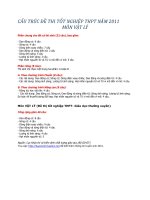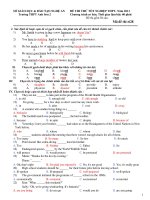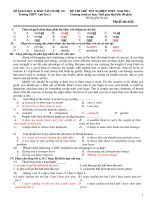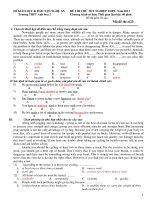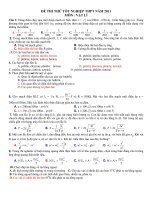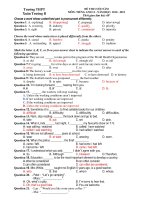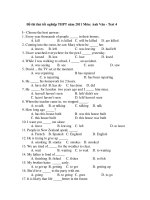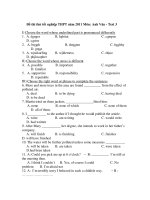ĐỀ THI MẪU TỐT NGHIỆP THPT NĂM 2011 – ĐỀ MẪU 12 docx
Bạn đang xem bản rút gọn của tài liệu. Xem và tải ngay bản đầy đủ của tài liệu tại đây (8.46 MB, 5 trang )
1
.
A
.
p
a
r
a
m
e
t
e
r
B
.
s
p
ee
dom
e
t
e
r
C
.
th
e
r
mo
m
e
t
e
r
D
.
c
on
s
c
i
ous
2.
A.
efficient
B.
deficient
C.
ancient
D.
sufficient
3.
A.
production
B.
definition
C.
situation
D.
politician
4.
A.
occasion
B.
qualification
C.
photography
D.
Canadian
5.
A.
edible
B.
ancient
C.
visual
D.
delicious
ĐỀ THI MẪU TỐT NGHIỆP THPT NĂM 2011 – ĐỀ MẪU 12
QUESTIONS 1-5: Choose one option A, B, C or D corresponding to the word whose main stress is on
the
syllable in the position which is different from that of the others. Identify your choice by circling letter
A,
B, C or D on the answer
sheet.
QUESTIONS 6 - 35: These are incomplete sentences. Choose A, B, C or D as your best choice
to
complete each sentence and then identify your answer by circling letter A, B, C or D on the answer
sheet.
6. Unlike moderate antislavery advocates, abolitionists an immediate
slavery.
A. demanded B. have demanding C. to be demanded D.
demands
7. Wherever there is plenty of rain during the growing season, life is in various
forms.
A. abundant B. the abundance C. a abundant time D.
abundance
8. The ceremonial Chilcat blanket of the Northwest Tlingit Indians was generally from cedar
bark,
wool, and goats'
hair.
A. wove B. to weave C. weaving D.
woven
9. The Greenhouse effect is a phenomenon that is caused when carbon dioxide and is trapped
in
the
atmosphere.
A. is released B. releases C. has been released D. had been
releasing
10. The typical elephant herd adult females and the young of both
sexes.
A. that is made up B. is made of C. is made D. is made up
of
11. Because the wood of the dogwood tree is very hard, is used for objects, such as roller
skate
wheels, in which hardness is
desired.
A. which B. it C. what D.
thus
12. Etymology, finding out where a word came from by studying the roots of words, has
been
greatly assisted by modern inventions like the
Internet.
A. is a technique of B. which a technique of C. a technique to D. a technique
of
13. The discovery of the halftone process in photography in 1881 made it photographs in books
and
newspapers.
A. possible reproducing B. possible to
reproduce
C. the possibility of reproducing D. possibly
reproduced
14. Coinciding with the development of jazz in New Orleans in the 1920's in blues
music.
A. was one of the greatest periods B. one of the greatest
periods
C. was of the greatest periods D. the greatest
periods
Nguyễn Thanh Tuấn – GV Tiếng Anh – THPT Tứ Kỳ - Tứ Kỳ - Hải Dương Page 36 of
40
15. A master is an electronic apparatus that radio and light
waves.
A. generated and was amplified B. generating and
amplifying
C. generates and amplifies D. to generate and
amplify
16. Black Boy is an autobiographical account of the childhood of Richard Wright and portrays the
suffering
of an African American
bigotry.
A. in a society full of B. in a full of society C. in of a full society D. in society of full
a
17.
James A. Bland, "Carry Me Back to Old Virginny" was adopted as the state song of Virginia
in
1940.
A. Were written by B. Be written by C. Has been written by D. Written
by
18. In her time, Isadora Duncan was today a liberated
woman.
A. what calling we would B. who would be
calling
C. what we would call D. she would call
her
19. Built in 1882, the Kinzua Viaduct in McKean County, Pennsylvania, is open only to
those
visitors are able to walk its 2,058-foot
length.
A. who B. to whom C. which D.
what
20. Warmer temperatures led to changes in the ecology of Europe, the animal
population
and methods of
hunting.
A. effecting B. effected C. affecting D.
affected
21. Although bats avoid entangled areas, they can dart about in the room filled with criss-crossing
wires
without ever hitting
one
they use the navigation functions in their
ear.
A. as long B. so long C. so long that D. as long
as
22. several years for bamboo seeds to grow into plants that can be used for commercial
purposes.
A. It took B. It takes C. It taken D. It
taking
23. The black-billed cuckoo has been known to steal eggs to other
birds.
A. belong B. which belonging C. which they belong D. that
belong
24. that distinguish human beings from other primates are related to the ability of people to
stand
upright and walk on two
legs.
A. Many of the physical characteristics
B.
Of the many physical
characteristics
C. The physical characteristics are many D. There are many physical
characteristics
25. At the beginning of the 20
th
century, people made coffee a cloth bag full of coffee grounds
into
boiling
water.
A. by have dumped B. by dumping C. by dumped D. by have been
dumping
26. The twentieth century has been a period of enormous growth in mathematical research and in
the
number of mathematicians and fields
them.
A. require B. requiring C. requires D. they
require
27. native to Europe, the daisy has now spread throughout most of North
America.
A. Although B. Despite of C. In spite D.
However
28. Chimpanzees, apes, orangutans and a few other primates laugh, but
.
A. another animals also laugh B. so other animals
do
C. no other animals do D. also do other animals
laugh
29.
The
Wildlife
Management
Act
of
1983
spelled
out
the
basic
rules
that
apply
in
the
US
today
but
heavy punishments on poachers selling illegal
furs.
A. include no B. includes no C. included no D. are including
no
30. Gorillas are quiet animals, they are capable of making about 20 different
sounds.
A. whether B. even though C. which D. as well
as
31. The Mono Lisa, painted in Florence in 1504 by Leonardo da Vinci, is a name which is perhaps
more
recognizable to people throughout the world to da Vinci
himself.
A. than that B. than C. as that D.
as
32. Speech is like a piece of cloth many threads including a voice box, lips, tongue, and a
good
brain.
A. make of B. made of C. is making of D. is made
of
33. The protection of technologies and technological information has become of many
countries.
A. the importance of a concern B. an importance
concern
C. the importance concerning D. an important
concern
34. Not only as a cooked dish the world over, but it is also used as the base of many other
foods,
condiments, and even
beverages.
A. eating rice B. is rice eaten C. rice is eaten D. people eat
rice
35. In the summer of 1974, a film producer named Allan Carr saw Grease on Broadway and
the
next day to see if the film rights were still
available.
A. impressed so that he was called B. he was called so impressed
that
C. was so impressed that he called D. that he was so called
impressed
QUESTIONS 36 - 45: Read the following passage carefully and then choose the best option to fit
each
space. Identify your choice by circling letter A, B, C or D on the answer
sheet.
Nguyễn Thanh Tuấn – GV Tiếng Anh – THPT Tứ Kỳ - Tứ Kỳ - Hải Dương Page 37 of
40
You have probably never heard of Charles Burgess Fry but in the early years of this century, he
was
the most famous man in England. He became (36) while
st
i
l
l at the university, mainly
(37)
of his sporting achievements. He was at the same time, captain of the university football, cricket
and
athletics
learns and held the world record for the long jump. He was (38) a popular sport
journalist.
He was so famous that letters addressed to "Mr. Fry, Oxford" were delivered to him (39)
any
difficulty. His college, although it had a quite different name, (40) known as "Fry's
College".
Some people have criticised Fry's sporting (41) _ . They point out that he lived at a time
(42)
standards were quite low and (43) was much easier to do well in several sports. It
is
certainly
true that athletes at that time did not have the totally dedicated approach of modern
athletes.
However, it is only fair to judge him (44) the standards of his (45) time. There is
no
doubt that he had extraordinary skills and an ability to write about sport with style and
intelligence.
36. A. fame B. rich C. well-known D.
common
37. A. because B. that C. which D.
thus
38. A. so B. too C. also D.
of
39. A. with B. without C. no D.
not
40. A. be B. which C. what D.
was
41. A. achievements B. succeed C. famous D.
expect
42. A. then B. when C. which D.
that
43. A. him B. men C. they D.
it
44. A. at B. beneath C. out of D.
to
45. A. single B. owe C. own D.
private
QUESTIONS 46 - 50: Read the following passage carefully and complete the sentences that follow
by
circling letter A, B, C or D as the correct answer and then mark your choice on the answer
sheet.
In the early 1800s, an Indian woman named Sacajawea helped explore the Northwest Territory of
the
United States. She went with Meriwether Lewis and William Clark on their expedition to chart that
area.
Sacajawea helped by creating good feelings between the explorers and the Native Americans living
in
the Northwest. She helped the explorers talk with the Indians. She showed them wild foods thai were
good
to eat. Once the Lewis and the Clark party met the Lemhi Shoshoni Indian. The Shoshoni were on
distant
terms with them, but Lewis and Clark needed their help. The two explorers sent Sacajawea to speak to
them.
She was delighted to find that her brother was their chief. As a result, they provided Lewis and Clark
with
everything they
needed.
The legend that Sacajawea led the expedition is not true. However, without her help in getting
horses,
supplies and other guides, Lewis and Clark could not have completed their
journey.
46. The best title of the passage is
.
A. Exploring the
Territory
B. Exploring the Northwest Territory of the United
States
C. Lewis and Clark - The
explorers
D. The language of
Sacajawea
47. Sacajawea was
.
A. of little help B. from India C. an Indian D. a spy for the
Shoshoni
48. According to the passage, the Shoshoni the
explorers.
A. live far from B. did not concern the C. were unfriendly to D. immediately
liked
49. The passage does not tell
.
A. whom Sacajawea went with B. what territory was
explored
C. how Sacajawea helped D. where Sacajawea was
born
50. The word expedition in paragraph one is closest in meaning to
.
A. vacation B. trip C. trail D.
experiment
QUESTIONS 51 - 55: Read the following passage carefully and complete the sentences that follow
by
circling letter A, B, C or D as the correct answers and then mark your choice on the answer
sheet
Why do people explore the farthest reaches of the globe? For John Clouse and Parke Thompson,
the
motivation is not curiosity, fame or fortune. It is just to break
records.
The two men, both in their sixties, are members of the Travellers' Century Club. To belong to this
club,
a person must have travelled to at least one hundred countries. The club has divided the world into
308
different units -countries, territories and other areas. A member who has visited every places listed
will
cover the entire
globe.
Clouse has visited 307 of the 308 locations on the club's list. Thompson claims to be the first and
the
only person to have visited all 308 listed places. However, Clouse says that, like himself, Thompson
has
Nguyễn Thanh Tuấn – GV Tiếng Anh – THPT Tứ Kỳ - Tứ Kỳ - Hải Dương Page 38 of
40
been to only 307 places. "Mr. Thompson hasn't been to Norwegian Antarctica," Clouse maintains. He
says
that also Thompson did visit the South Pole, the land he stood on was not under Norwegian
control.
51. The best title for the passage is
.
A. Countries and Territories of the
world
B. Clouse and Thompson - world
travellers
C. Why people
travel
D. Travelling for a hundred
years
52.
A must -
p
r
i
nc
i
p
l
e
to
become
a
member
i
n
Tr
a
v
e
ll
e
r
s
'
Century C
l
ub
i
s
that
a
c
a
nd
i
d
a
t
e
has
v
i
s
i
t
e
d
.
A. 308 different places B. 100
countries
C the South Pole D. Norwegian
Antarctica
53. The man who claims to have visited all 308 locations on the club's list is
.
A. Parke Thompson B. John Clouse C. Pake Clouse D. John
Thompson
54. The passage implies that these two men
.
A. avoid flying B. give trail talks C. enjoy competition D. no longer
travel
55. The word motivation in paragraph 1 means„
.
A. movement B. change of place C. reason for action D. ability to
move
QUESTIONS 56 - 60: Each of the following sentences has four underlined words or phrases marked
A,
B, C, and D. Choose the word or phrase which must be changed in order for the sentence to be correct
by
circling letter A, B, C or D and then mark your choice on the answer
sheet.
56. From (A) 1905 to 1920, American novelist Edith Wharton was (B) at the height of her writing
career,
publishing of her (C) three most (D) famous
novels.
57. The Rocky Mountains were (A) explored by (B) fur traders during the early 1800's, in a (C)
decades
preceding (D) the United States Civil
War.
58. In human beings as in other mammal (A), hairs around (B) the eyes and ears and in the nose prevent
(C)
dust, insects, and other matters from entering (D) these
organs.
59. Rice, which it still (A) forms the staple diet of much (B) of the world's population, grows best (C) in
hot
(D), wet
lands.
60. Because of its (A) vast tracts of virtually (B) uninhabited northern forest, Canada has one (C) of
the
lowest population density (D) in the
world.
QUESTIONS 61 - 70: Choose one option A, B, C or D corresponding to the sentence which has the
same
meaning as the original one and mark your choice on the answer
sheet.
61. If we don't leave the party now we will miss the last
train.
A. If
we
l
ea
v
e
the
party now we
w
ou
l
d
have not m
i
ss
the
l
a
s
t
t
r
a
i
n.
B.
If
we
l
ea
v
e
the
party now we cou
l
d
not have m
i
ss
e
d
the
l
a
s
t
t
r
a
i
n.
C.
We ought
to
l
ea
v
e
the
party now
if
we are
to
catch
the
l
a
s
t
t
r
a
i
n.
D
.
We ought
to
l
ea
v
e
the
party now
if
we
w
ou
l
d
catch
the
l
a
s
t
t
r
a
i
n.
62.
No
one
present
no
t
i
c
e
d
a
n
y
t
h
i
ng
s
t
r
a
ng
e
.
A. The
p
e
op
l
e
who were there d
i
dn'
t
no
t
i
c
e
a
n
y
t
h
i
ng
s
t
r
a
ng
e
.
B.
The p
e
op
l
e
who were there d
i
dn'
t
no
t
i
c
e
a
n
y
t
h
i
ng
u
s
u
a
l
.
C.
The p
e
op
l
e
were there d
i
dn'
t
no
t
i
c
e
a
n
y
t
h
i
ng
s
t
r
a
ng
e
.
D. The
p
e
op
l
e
who were there d
i
dn'
t
no
t
i
c
e
s
om
e
t
h
i
ng
s
t
r
a
ng
e
.
63. Jane's
strange
i
d
ea
a
s
t
on
i
s
h
e
d
e
v
e
ry
bod
y
.
A. Everybody was
a
s
t
on
i
s
h
e
d
at Jane's
strange
i
d
ea
.
B.
Everybody were
a
s
t
on
i
s
h
e
d
at Jane's
strange
i
d
ea
.
C.
Everybody was
a
s
t
on
i
s
h
e
d
on Jane's
strange
i
d
ea
.
D. Everybody was
a
s
t
on
i
s
h
e
d
about
Jane's
strange
i
d
ea
.
64.
"Don't
l
ea
v
e
the house
un
t
il
I
get
back,
J
ohn,
"
h
i
s
s
i
s
t
e
r
s
a
i
d.
A.
John's
s
i
s
t
e
r
t
o
l
d
h
i
m
not
to
l
ea
v
e
the house
when
she
got b
a
c
k
.
B. John's
s
i
s
t
e
r
t
o
l
d
h
i
m
not
to go
out till
she get
b
a
c
k
.
C. John's
s
i
s
t
e
r
t
o
l
d
h
i
m
to go
out un
t
il
she
got b
a
c
k
.
D.
John's
s
i
s
t
e
r
t
o
l
d
h
i
m
to
stay
at
home
till
she
got b
a
c
k
.
65.
You will
catch
a
co
l
d
if
you don't keep your
f
ee
t
d
ry
.
A. Don't keep your
f
ee
t
dry or you will
catch
a
co
l
d.
B.
U
n
l
e
ss
you keep your
f
ee
t
dry you will
not catch
a
co
l
d.
C.
U
n
l
e
ss
you keep your
f
ee
t
dry, you will
catch
a
co
l
d.
D. You will
not catch
a
co
l
d
if
you don't keep your
f
ee
t
d
ry
.
66.
The
gate
i
s
c
l
o
s
e
d
to
stop
the
ch
il
d
r
e
n
r
unn
i
ng
i
n
t
o
the
road.
Nguyễn Thanh Tuấn – GV Tiếng Anh – THPT Tứ Kỳ - Tứ Kỳ - Hải Dương Page 39 of
40
A. The
gate
i
s
so
c
l
o
s
e
d
that
the
ch
il
d
r
e
n
cannot run
i
n
t
o
the
road.
B.
The
gate
i
s
c
l
o
s
e
d
so
that
the
ch
il
d
r
e
n
cannot run
i
n
t
o
the
road.
C.
The
gate
i
s
c
l
o
s
e
d
to the
ch
il
d
r
e
n
cannot run
i
n
t
o
the
r
o
a
d.
D. The
gate
i
s
c
l
o
s
e
d
and
that
the
ch
il
d
r
e
n
cannot run
i
n
t
o
the
r
o
a
d.
67.
Jack bought that second-hand car
and he
then
r
e
cogn
i
s
e
d
that
he
s
hou
l
dn'
t
have done
that.
A. Jack regretted bu
y
i
ng
that second-hand car.
B.
Jack regretted
to
buy that second-hand c
a
r
.
C.
Jack
w
i
s
h
e
d
he
d
i
d
not bought that second-hand car. D. Jack
w
i
s
h
e
d
he has
not bought that second-hand c
a
r
.
68. Joan
fi
n
a
ll
y
managed to get
a
good
j
ob.
A.
Joan
fi
n
a
ll
y
succeeded
at
g
e
tt
i
ng
a
good
j
ob.
B. Joan
fi
n
a
ll
y
succeeded
i
n
g
e
tt
i
ng
a
good
j
ob.
C. Joan
fi
n
a
ll
y
succeeded on
g
e
tt
i
ng
a
good
j
ob.
D.
Joan
fi
n
a
ll
y
succeeded to get
a
good
j
ob.
69. S
m
i
t
h'
s
career
as a
t
e
l
e
v
i
s
i
on
presenter began
fi
v
e
years
ago.
A. S
m
i
t
h
had
been a
t
e
l
e
v
i
s
i
on
presenter
for
fi
v
e
years.
B. S
m
i
t
h
has been a
t
e
l
e
v
i
s
i
on
presenter
fi
v
e
years
ago.
C. S
m
i
t
h
has been a
t
e
l
e
v
i
s
i
on
presenter
s
i
nc
e
fi
v
e
years.
D. Sm
i
t
h
has been a
t
e
l
e
v
i
s
i
on
presenter
for
fi
v
e
y
ea
r
s
.
70.
"Don't
b
i
t
e
your
n
a
il
s
a
n
y
mo
r
e
,
"
s
a
i
d
Mrs.
Francesca to her
son.
A. Mrs.
Francesca
t
o
l
d
her son stop b
i
t
i
ng
h
i
s
n
a
il
s
.
B.
Mrs.
Francesca
t
o
l
d
her son to stop b
i
t
e
h
i
s
n
a
il
s
.
C.
Mrs.
Francesca
t
o
l
d
her son to stop b
i
t
i
ng
h
i
s
n
a
il
s
.
D. Mrs.
Francesca
t
o
l
d
her son to stop to b
i
t
e
h
i
s
n
a
il
s
.
QUESTIONS 71 - 80: Choose one option A, B, C or D corresponding to the best sentence which is
made
up from the given cue words and then mark your choice on the answer
sheet.
71.
weather
/
not
/
d
e
c
i
d
e
/
we
/ go
out
/ because.
A. We
d
e
c
i
d
e
d
not
go
out
because
of
the
weather.
B.
We d
e
c
i
d
e
d
not
to go
out
because
of
the
w
ea
t
h
e
r
.
C.
We d
e
c
i
d
e
d
not go
i
ng
out
because
of
the
weather.
D. We not d
e
c
i
d
e
d
to go
out
because
of
the
w
ea
t
h
e
r
.
72.
a
ll
o
w
/ she /
smoke
/ house.
A.
She
doesn't
a
ll
o
w
s
mo
k
i
ng
i
n
her
house. B. She
doesn't
a
ll
o
w
to
s
mo
k
i
ng
i
n
her
house.
C. She
doesn't
a
ll
o
w
to
smoke
i
n
her
house.
D.
She
doesn't
a
ll
o
w
s
mo
k
i
ng
at
her
house.
73.
t
h
i
s
coat /
you
/
p
r
e
f
e
r
/ coat /
wear
/
y
e
s
t
e
r
d
a
y
.
A. I
p
r
e
f
e
r
t
h
i
s
coat
than
the
coat you were
w
ea
r
i
ng
yesterday.
B. I
p
r
e
f
e
r
t
h
i
s
coat
to the coat
you wear
y
e
s
t
e
r
d
a
y
.
C.
I
p
r
e
f
e
r
t
h
i
s
coat to the coat
you
w
ea
r
i
ng
yesterday. D.
I
p
r
e
f
e
r
t
h
i
s
coat to the coat
you wore
y
e
s
t
e
r
d
a
y
.
74.
you
/
I
/
w
ou
l
d
rather
/
say
/
t
e
ll
/
a
n
y
on
e
.
A. I
w
ou
l
d
rather you not
t
e
ll
anyone what
I
s
a
i
d.
B.
I
w
ou
l
d
rather you d
i
dn'
t
t
e
ll
anyone what
I
s
a
i
d.
C.
I
w
ou
l
d
rather you don't
t
e
ll
anyone what
I
s
a
i
d.
D. I
w
ou
l
d
rather you d
i
dn'
t
t
e
ll
anyone what
I
s
a
y
.
75.
must
/
f
e
d
up /
study
/ she / be.
A.
She
must
be
f
e
d
up
of
s
t
ud
y
i
ng.
B. She
must
f
e
d
up
w
i
t
h
s
t
ud
y
i
ng.
C. She
must
be
f
e
d
up
w
i
t
h
s
t
ud
y
i
ng.
D.
She
must
be
f
e
d
up on
s
t
ud
y
i
ng.
76.
c
li
mb
/
w
i
ndo
w
/
w
i
t
hou
t
/ see /
t
h
e
y
.
A. They
c
li
mb
e
d
through
w
i
ndo
w
w
i
t
hou
t
b
e
i
ng
seen. B.
They c
li
mb
e
d
through
the
w
i
ndo
w
w
i
t
hou
t
b
e
i
ng
s
ee
n.
C.
They c
li
mb
e
d
through
the
w
i
ndo
w
w
i
t
hou
t
b
e
i
ng
see.
D. They
c
li
mb
e
d
through
the
w
i
ndo
w
w
i
t
hou
t
b
e
i
ng
saw.
77.
l
oo
k
f
o
rw
a
r
d
/ Rose /
come
/
home
/
w
e
.
A. We are
l
oo
k
i
ng
f
o
rw
a
r
d
to Rose
com
i
ng
home. B.
We are
l
oo
k
i
ng
f
o
rw
a
r
d
Rose
com
i
ng
home.
C.
We are
l
oo
k
i
ng
f
o
rw
a
r
d
to Rose
come
home.
D. We are
l
oo
k
i
ng
f
o
rw
a
r
d
Rose to
come
home.
78.
f
ee
l
/
you
/
li
k
e
/ go
out
/
t
h
i
s
e
v
e
n
i
ng
?
A. Are you
f
ee
l
li
k
e
go
i
ng
out
t
h
i
s
e
v
e
n
i
ng
?
B.
Do you
f
ee
l
to
li
k
e
go
i
ng
out
t
h
i
s
e
v
e
n
i
ng
?
C.
Do you
f
ee
l
li
k
e
go
out
t
h
i
s
e
v
e
n
i
ng
?
D. Do you
f
ee
l
li
k
e
go
i
ng
out
t
h
i
s
e
v
e
n
i
ng
?
79.
want
/ P
h
illi
p
s
/
Dave
/
cook
/
h
e
l
p
/
i
n
s
i
s
t
/
h
i
m
/
h
i
m
s
e
lf
.
A. P
h
illi
p
s
wanted
to
cook h
i
m
s
e
lf
but
D
a
n
i
e
l
i
n
s
i
s
t
e
d
i
n
h
e
l
p
i
ng
h
i
m.
B. P
h
illi
p
s
wanted
to
cook h
i
m
s
e
lf
but
D
a
n
i
e
l
i
n
s
i
s
t
e
d
to
h
e
l
p
h
i
m.
C. P
h
illi
p
s
wanted
to
cook h
i
m
s
e
lf
but
D
a
n
i
e
l
i
n
s
i
s
t
e
d
on
h
e
l
p
i
ng
h
i
m.
D. P
h
illi
p
s
wanted coo
k
i
ng
h
i
m
s
e
lf
but
D
a
n
i
e
l
i
n
s
i
s
t
e
d
on
h
e
l
p
i
ng
h
i
m.
80.
p
r
e
f
e
r
/
I
/
d
r
i
v
e
/
t
r
a
i
n
/
t
r
a
v
e
l
.
A. I
p
r
e
f
e
r
d
r
i
v
i
ng
than
t
r
a
v
e
lli
ng
by t
r
a
i
n.
B.
I
p
r
e
f
e
r
d
r
i
v
i
ng
to
t
r
a
v
e
lli
ng
by t
r
a
i
n.
C.
I
p
r
e
f
e
r
to
d
r
i
v
e
to
t
r
a
v
e
l
by t
r
a
i
n.
D. I
p
r
e
f
e
r
to
d
r
i
v
i
ng
than
t
r
a
v
e
lli
ng
by t
r
a
i
n.
Nguyễn Thanh Tuấn – GV Tiếng Anh – THPT Tứ Kỳ - Tứ Kỳ - Hải Dương Page 40 of
40

